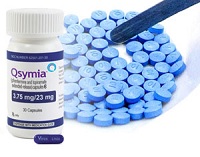Bad news for struggling obesity drugmakers: Things aren't going to get any better, one analyst says. And the way he sees it, for leaders Orexigen ($OREX) and Vivus ($VVUS), they're likely to get much worse.
 As RBC Capital Markets' Simos Simeonidis figures, third-to-market Orexigen's marketing partnership with Takeda--which put 900 reps behind product Contrave--is responsible for the company's current market lead. But now that the partnership is in its second year, the Japanese pharma is no longer required to spend as much on the drug or "devote as much valuable salesforce resources" to Contrave, he wrote in a note to clients. Plus, if Takeda "starts to gradually cut back on the size and scope of the reimbursement it offers … we may start to see a slowdown in the growth of Contrave prescriptions," he noted.
As RBC Capital Markets' Simos Simeonidis figures, third-to-market Orexigen's marketing partnership with Takeda--which put 900 reps behind product Contrave--is responsible for the company's current market lead. But now that the partnership is in its second year, the Japanese pharma is no longer required to spend as much on the drug or "devote as much valuable salesforce resources" to Contrave, he wrote in a note to clients. Plus, if Takeda "starts to gradually cut back on the size and scope of the reimbursement it offers … we may start to see a slowdown in the growth of Contrave prescriptions," he noted.
But that's not the worst scenario for La Jolla, California-based Orexigen. Takeda is on the hook for a $50 million spend in both 2016 and 2017 for a product that netted just $53 million in 2015 sales. And with those figures, Simeonidis believes the entire partnership may be at risk. "It may be a lot cheaper for Takeda to pay whatever the penalty for breaking up and walking away from the contract may be, than staying in and trying to save this venture," he pointed out.
 And it won't just be Orexigen that's hurt if Takeda scales back or bails, Simeonidis predicts. Those scenarios would dent sales in the whole obesity space--including for Vivus, which has been struggling to keep its therapy, Qsymia, afloat with just 50 reps behind it. While the med has managed to cling to most of its market share--even after paring down its rep tally by 67%--weekly prescriptions are still down 17% from the year-ago quarter, and less exposure for obesity meds isn't going to help.
And it won't just be Orexigen that's hurt if Takeda scales back or bails, Simeonidis predicts. Those scenarios would dent sales in the whole obesity space--including for Vivus, which has been struggling to keep its therapy, Qsymia, afloat with just 50 reps behind it. While the med has managed to cling to most of its market share--even after paring down its rep tally by 67%--weekly prescriptions are still down 17% from the year-ago quarter, and less exposure for obesity meds isn't going to help.
So what can obesity drugmakers do to ease the pain? According to Simeonidis, not much. Mountain View, California-based Vivus, for one, is saddled with $300 million in debt and has to fork over another $200 million to $250 million on a required post-marketing cardiovascular outcomes trial. "We don't foresee a way around the company's current commercial, regulatory and financial issues, at least not near-term," he wrote.
And things look bleak for Orexigen, too, whose plan to look to European sales is not going to be enough. Without a Takeda-style marketing partner on the continent, opportunity there "will take a long time to materialize and will not be impactful," Simeonidis predicted.
Special Reports: Limited attention span? Focus on these market shake-ups in 2015 | 10 top drug launch disasters